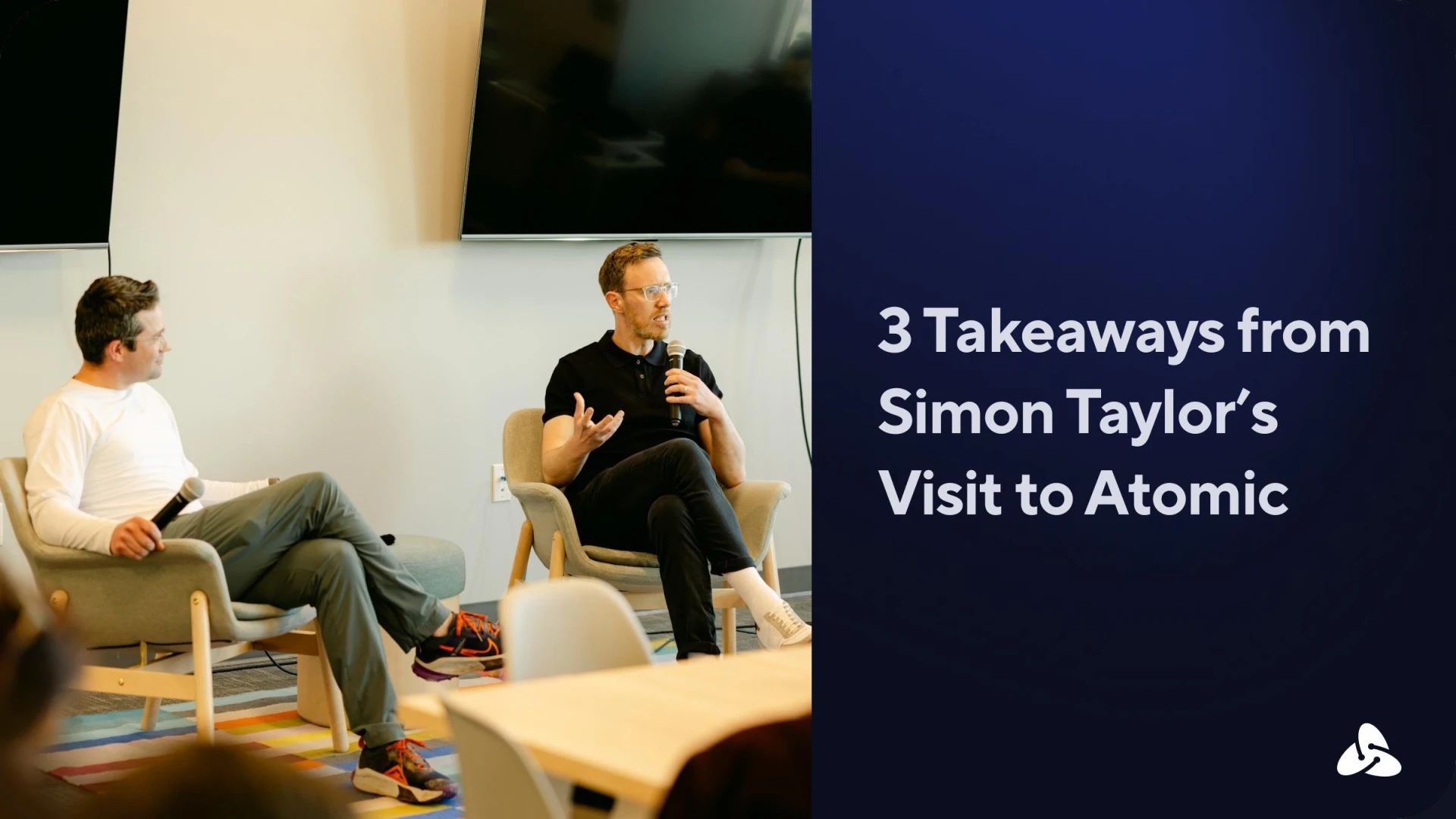3 Takeaways from Simon Taylor’s Visit to Atomic

Sarah Beale
Content Writer

Simon Taylor, Head of Strategy & Content at Sardine, recently headed to Utah and visited with Atomic CEO Jordan Wright and members of the Utah Fintech community. This fireside chat hit on many topics in the larger fintech landscape and some key emerging trends. With 20 years of financial services experience, Simon is the ideal person to talk about the next big thing in fintech and open finance. Actually, there were several big things, but we narrowed it down to just three for today – the effect of consent orders, generative artificial intelligence (AI) in banking, and a default global mindset.
Consent Orders Aren’t the End of Fintech
Consent orders are hitting financial institutions at an astonishing rate. While this is alarming, Simon doesn’t take it as a sign to abandon the fintech ship just yet. “It doesn’t mean that financial services shouldn’t show up at the point of need, it should,” he said. “The system is correcting itself. It’s balancing. But don’t overcorrect from that. Don’t think that this isn’t a long-term opportunity.” The opportunity is still there, but consent orders may change how banks and fintechs take advantage of it.
Simon predicted that consent orders might also change how we talk about fintech. For example, companies may distance themselves from the term banking as a service (BaaS) and replace it with better finance or better banking. Despite these growing pains, this is still the place to be for innovation and open finance. “Repackaging financial services is just the most important thing in the world,” Simon said. “Because finance touches everything we do.”
Generative AI in Banking
Generative AI has, well, generated a lot of hype. But Simon was surprised at the reaction from the financial services industry. “I feel like financial services was already bored of it when it showed up,” he said. “That I did not expect. The best use cases I’m seeing for generative AI are in financial services.” These use cases revolve around inflexible PDF forms and complicated processes that can change dramatically based on a single input.
When it comes to a loan application for a mortgage or government forms, “They’re all incredibly hard to work with. And I don’t think that’s going to change in the next 10 years. Maybe 20 years. I need something that can deal with all that work where there isn’t an API.” Simon sees generative AI as a solution to that problem.
Default Global
Transactions across borders come with their own special set of challenges, and their own opportunities. The world economy is becoming increasingly interconnected, which means more money crossing borders more often. Companies that can solve the problems associated with that and simplify the process will be primed for success. Thinking about money as a borderless concept is what Simon refers to as default global.
Default global assumes a global mindset from the beginning, similar to being default digital. This has benefits in the long run, but requires more preparation up front. For example, taxation laws vary from country to country. Simon spoke about how this works in Brazil. “They have capital controls, so there’s only so much money you can move in and out. They have tax rules. You as the sending party have to make sure that the other party receiving it is taking care of all that. So you have to know, not just the laws in your own country, you have to know the laws in every other country you might consider.”

Implications for Open Finance
Consent orders might seem like a hindrance to open finance, but what’s driving them is compliance, or a lack thereof. Open finance should increase competition and give consumers better access to their data, but this is only helpful if it’s done responsibly. Pushing through extra regulatory scrutiny leads to better results for consumers. Going along with that, AI in open finance has huge potential when it comes to better managing money. AI needs a large, complete, accurate dataset to be helpful and bringing together all of a customer’s data is the first step to programming an application that makes personalized suggestions.
This is crucial to Atomic’s goal of helping the financially disadvantaged. As Jordan said recently, “We’re moving towards an ecosystem that’s more open, competitive, and customer-centric. This shift is changing how we interact with financial data–and is a significant chance for us and others to develop a new open finance data and technology stack.” Partnerships among fintech and financial institutions are the only way to make this a reality and improve the financial circumstances of the most vulnerable.


